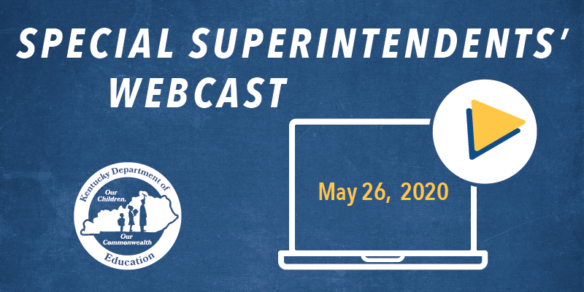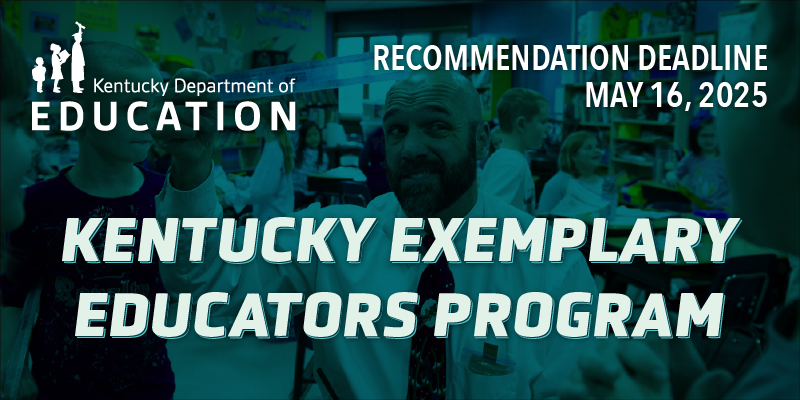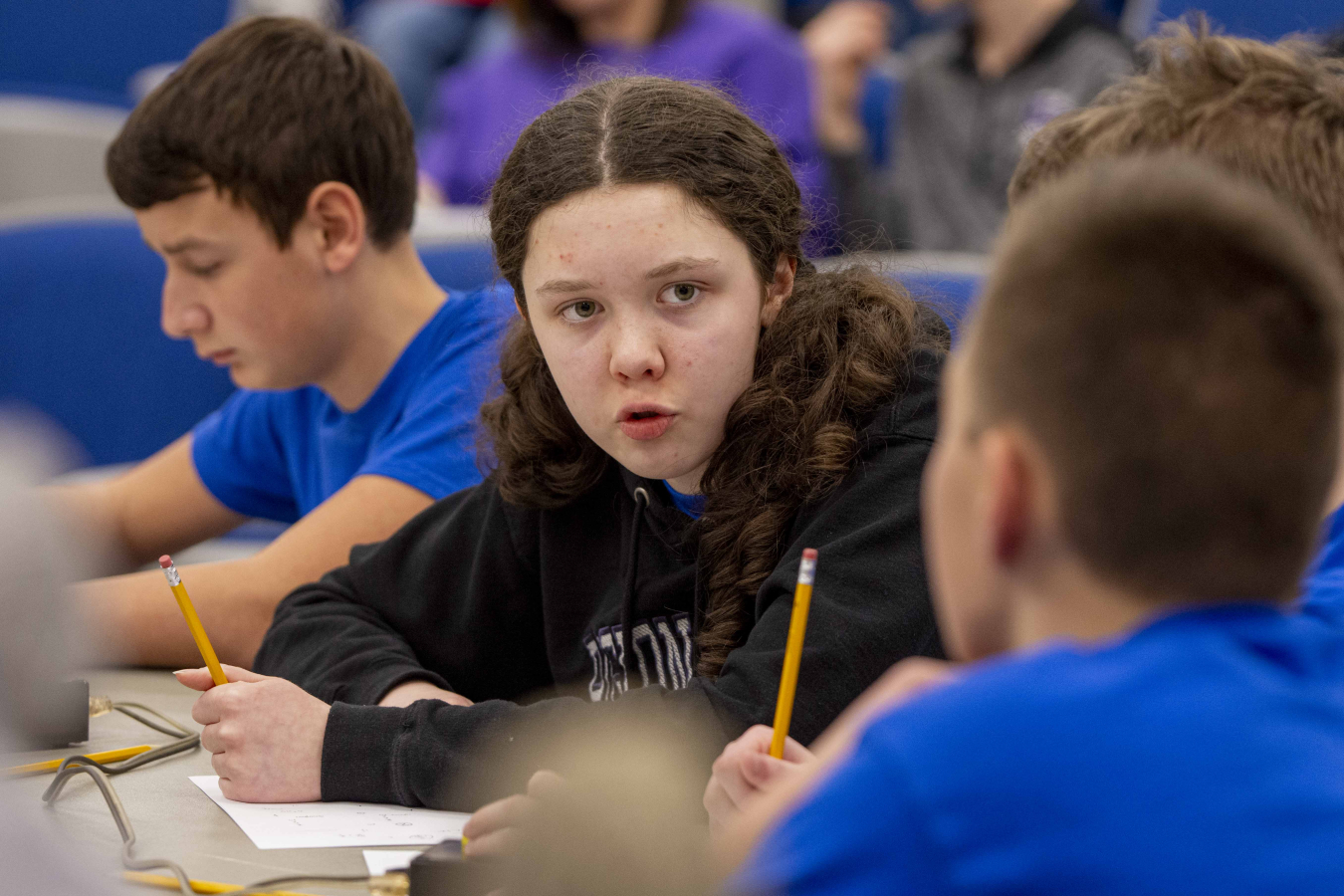
- While COVID-19 guidance has been updated as new information becomes available, Dr. Steven Stack believes that the current guidance on wearing masks will be a part of everyday life for Kentuckians for the foreseeable future.
- By limiting the number of contacts an individual student makes throughout the day, it makes it easier to conduct the recently introduced contact tracing program.
By Jacob Perkins
Jacob.perkins@education.ky.gov
As the COVID-19 pandemic continues to affect the Commonwealth, the Kentucky Department for Public Health (DPH) joined Kentucky’s 172 superintendents and leadership from the Kentucky Department of Education (KDE) during a May 26 webcast to offer guidance on reopening school buildings in the fall.
Dr. Steven Stack, commissioner of DPH, provided an overview of the virus and explained that a vaccine will not be available until at least 2021. He is hopeful that a therapeutic option will be found before a vaccine. In the meantime, schools will face challenges as they begin to plan for a potential reopening.
“We don’t have a vaccine and we won’t have one this year, so it’s not going to help you for a school year,” said Stack. “We don’t currently have a treatment and we’re not likely to get one before the school year is fully underway, so you have to plan assuming there’s no treatment. What we have to do is rely on social distancing and other public health measures to reduce the risk of infection.”
According to Stack, this means that we “thin ourselves out” by staying a minimum of six feet away from one another. The six feet of distance, along with recent guidance released by the Centers for Disease Control and Prevention that states students should be seated in every other seat when on a school bus, raised some concerns about the practicalities of transporting students to school.
“We can’t transport like that and if we don’t transport we can’t have school. Is there any realistic guidance for school buses,” asked one superintendent during the webcast.
Stack, acknowledging that this will be a challenge for districts, said that he does not have an answer.
“If you put them all too close together, they end up spreading infection and even if we tell all of the children to wear masks, we see how successful we are with adults, unfortunately,” said Stack.
The topic of masks was a recurring theme throughout the webcast. Superintendents raised several concerns including whether staff and students would be required to wear masks upon re-entering school buildings.
While COVID-19 guidance has been updated as new information becomes available, Stack believes that the current guidance on wearing masks will be a part of everyday life for Kentuckians for the foreseeable future.
However, he does note that students who may not be able to wear masks, including special needs students with sensory issues, should not be asked to do so. Teachers working with these students are strongly urged to continue wearing a mask when working with the child.
DPH recommends that when districts begin implementing a reopening plan, they consider grouping students together. This could mean that schools group students together in homeroom and then teachers move from class to class to reduce the number of contacts within the building.
“If we’ve got a group of students who stay together, then if one of them gets sick we’re only having to look at caring for a smaller group as opposed to if one kid gets sick and they’ve been intermingling with 250 kids in the high school,” said DPH Deputy Commissioner Dr. Connie White.
By limiting the number of contacts an individual student makes throughout the day, it makes it easier to conduct the recently introduced contact tracing program.
In a May 21 call with superintendents, Gov. Andy Beshear and Mark Carter – who was recently appointed as executive adviser leading the contact tracing for the Cabinet for Health and Family Services – introduced the contact tracing program and spoke of the importance of contact tracing as a way to manage the transmission of the virus.
Superintendents expressed hesitancy with placing students in homeroom and having teachers rotate because of scheduling conflicts with students and because most teachers are not certified to teach multiple subjects.
“It’s going to be important to think about as you look at class schedules to try and group students who have similar schedules where they can be grouped for long periods of time,” said Jan Bright, manager of DPH’s Child and Family Health Improvement Branch.
Although DPH told superintendents that implementation of this guidance should be guided by what is feasible, practical, acceptable and tailored to the needs of each community, superintendents began to state that they are not optimistic about a fall reopening.
“The challenges are significant and it doesn’t mean we won’t let schools open up,” said Stack. “It may mean that we have to accept that when school opens up that there are more kids together than we would prefer because of the counterbalancing trade-off of having them fall further behind in education.”
As for planning for the next school year, Interim Education Commissioner Kevin C. Brown recommended that districts include plans for non-traditional instruction (NTI) as well as plans for a traditional in-person classroom setting.
At its March 18 meeting, the Kentucky Board of Education approved waivers that allowed all 172 Kentucky school districts to join the NTI Program. However, this waiver was only applicable for the 2019-2020 school year.
Beginning next school year, districts will again only be allowed 10 NTI days and superintendents said that with this restriction in place, it is difficult to plan innovative practices.
Brown reassured districts that they could “take it to the bank” that they would have additional NTI days in the fall.
“We are going to do that through the governor’s emergency executive order authority,” said Brown. “Even if we did not do it through that authority, I am confident that the general assembly would have gone back and made that retroactive when they meet in January.”
Brown said that the plan is for the department to request a waiver similar to the one issued by Lt. Gov. Jacqueline Coleman, secretary of the Kentucky Education and Workforce Development Cabinet, on April 3 that suspended the requirement that students who plan to graduate from high school in 2020 pass a civics test, as well as certain requirements for completing an early high school graduation program.
The waiver will request additional NTI days, which Brown says will be the easy part. The more difficult aspect of the designation will be figuring out how attendance and funding will be counted if Kentucky continues forward with an adjusted opening in which schools reopen with staff shortages or social distancing measures that will impact capacity, or with the possibility of some schools being unable to reopen.
Brown said he plans to have the NTI waiver submitted to Coleman’s office by mid-June.
MORE INFO …
- May 26 Special Superintendents’ Webcast
- Kentucky Department for Public Health’s COVID-19 webpage
- KDE’s COVID-19 webpage
- COVID-19 Hotline (800) 722-5725




I don’t understand why we aren’t testing the staff and employees of the school districts? Let’s make sure they’re covid free. Then set up sites at different area schools to begin testing families or kids etc.
Once we know who has it they quarantine with family. Once they have two negative test come school or work.
Also if they can have a rapid test done or made to have on at schools we can know quicker if some has caught the during school season.
We could be working on that during summer vacation so have a better grip on things for all employees and students. Because I’m a bus driver and caregiver to my eldest daughter. I don’t want to bring anything home comprise her health
As a bus driver for 33 years in Oldham Co, I feel we should wait until there is a vaccine or many many less cases of covid 19. You can not put 70 students safety on a bus with this type of virus. I’m 66 years old could retire but choose not to because there are no drivers as is and I love my job and mostly my kids that I drive. I am now concerned about my health and don’t want to bring anything home to my granddaughters. So please think long and hard before you open school and risk the life of your students and drivers. I’m raising my two granddaughters and teaching them at home worked well and very willing to do it again if we have to.